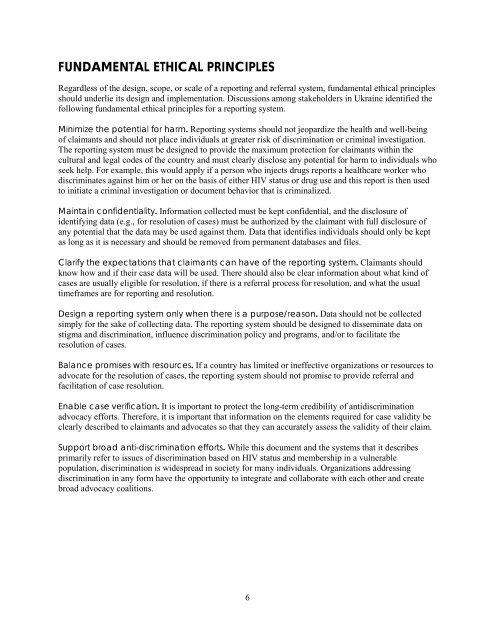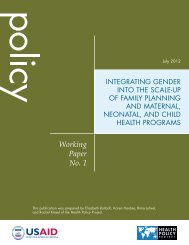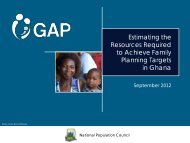English Version - Health Policy Project
English Version - Health Policy Project
English Version - Health Policy Project
Create successful ePaper yourself
Turn your PDF publications into a flip-book with our unique Google optimized e-Paper software.
FUNDAMENTAL ETHICAL PRINCIPLES<br />
Regardless of the design, scope, or scale of a reporting and referral system, fundamental ethical principles<br />
should underlie its design and implementation. Discussions among stakeholders in Ukraine identified the<br />
following fundamental ethical principles for a reporting system.<br />
Minimize the potential for harm. Reporting systems should not jeopardize the health and well-being<br />
of claimants and should not place individuals at greater risk of discrimination or criminal investigation.<br />
The reporting system must be designed to provide the maximum protection for claimants within the<br />
cultural and legal codes of the country and must clearly disclose any potential for harm to individuals who<br />
seek help. For example, this would apply if a person who injects drugs reports a healthcare worker who<br />
discriminates against him or her on the basis of either HIV status or drug use and this report is then used<br />
to initiate a criminal investigation or document behavior that is criminalized.<br />
Maintain confidentiality. Information collected must be kept confidential, and the disclosure of<br />
identifying data (e.g., for resolution of cases) must be authorized by the claimant with full disclosure of<br />
any potential that the data may be used against them. Data that identifies individuals should only be kept<br />
as long as it is necessary and should be removed from permanent databases and files.<br />
Clarify the expectations that claimants can have of the reporting system. Claimants should<br />
know how and if their case data will be used. There should also be clear information about what kind of<br />
cases are usually eligible for resolution, if there is a referral process for resolution, and what the usual<br />
timeframes are for reporting and resolution.<br />
Design a reporting system only when there is a purpose/reason. Data should not be collected<br />
simply for the sake of collecting data. The reporting system should be designed to disseminate data on<br />
stigma and discrimination, influence discrimination policy and programs, and/or to facilitate the<br />
resolution of cases.<br />
Balance promises with resources. If a country has limited or ineffective organizations or resources to<br />
advocate for the resolution of cases, the reporting system should not promise to provide referral and<br />
facilitation of case resolution.<br />
Enable case verification. It is important to protect the long-term credibility of antidiscrimination<br />
advocacy efforts. Therefore, it is important that information on the elements required for case validity be<br />
clearly described to claimants and advocates so that they can accurately assess the validity of their claim.<br />
Support broad anti-discrimination efforts. While this document and the systems that it describes<br />
primarily refer to issues of discrimination based on HIV status and membership in a vulnerable<br />
population, discrimination is widespread in society for many individuals. Organizations addressing<br />
discrimination in any form have the opportunity to integrate and collaborate with each other and create<br />
broad advocacy coalitions.<br />
6
















